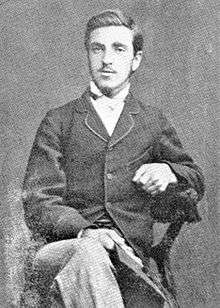Thomas Ball Barratt
Thomas Ball Barratt (22 July 1862, Cornwall, England – 29 January 1940, Oslo, Norway) was a British-born Norwegian pastor and one of the founding figures of the Pentecostal movement in Europe.
Thomas Ball Barratt | |
|---|---|
 Thomas Ball Barratt, 16 years old. | |
| Born | 22 July 1862 Cornwall, England |
| Died | 29 January 1940 |
| Occupation | Minister |
| Spouse(s) | ? |
| Children | ? |
| Parent(s) | ? |
| Religion | Methodism, Pentecostalism |
Life and Ministry
Although born in Cornwall, his parents emigrated to Norway when he was four years old, and he grew up to be fluent in English and Norwegian. After he began preaching at age 17, he pastored several churches in the Methodist Episcopal Church of Norway.[1] In 1905, as head of the Methodist City Mission in Oslo, Barratt travelled to the United States with the aim of raising funds to build new premises in Oslo. He was baptised in the Holy Spirit and spoke and sang in tongues on 7 October 1906 while staying in New York City, after hearing news of the Azusa Street Revival in Los Angeles.[2]
He returned to Norway in December 1906 without funds or church support. Nevertheless, starting in 1907, he held revival meetings in Oslo at his newly formed "Filadelfia" assembly, which attracted international attention, and he became one of the prime movers of the Pentecostal movement in Europe. Lewi Pethrus from Sweden, Alexander Boddy from England and Jonathan Paul from Germany came to Oslo, and became convinced of the divine origin of the movement. They became leaders of the Pentecostal movement in their respective countries.
Alexander Boddy visited Barratt early in 1907 and prevailed upon him to visit Sunderland. Barratt sailed from Norway in late August 1907, arriving at Newcastle in September. His preaching marked the beginning of the meetings at All Saints Church in Monkwearmouth, Sunderland, under the ministry of Boddy. On 13 September, Barratt wrote "the eyes of the religious millions of Great Britain are mow fixed on Sunderland." Nevertheless his observation was not reflected in writings from the established church. Barratt returned to Norway on 18 October.[3]
Barratt continued to travel abroad, visiting Sweden, Finland, Poland, Estonia, Iceland and Denmark.
The Methodist Episcopal Church terminated Barratt's membership in 1909, after which he travelled to the UK once more, preaching in Sion College, London and then returning to Sunderland for what had become an annual Pentecost celebration known as the Whitsuntide Convention. He then visited Bournemouth and stayed with Stanley Frodsham, another early Pentecostal pioneer and writer. He emigrated to America and from there he continued his oversees travel, visiting Palestine and India.
Barrett was elected President of the Great European Pentecostal Conference in Stockholm in 1939. The vote was unanimous.
Barratt died on January 29th, 1940 in Oslo and was buried there. Up to 20,000 people are said to have lined the streets for his funeral.[4][5]
References
- Bundy, David D. (2002). "Barratt, Thomas Ball". In Stanley M. Burgess (ed.). The new international dictionary of Pentecostal and charismatic movements (Rev. and expanded ed.). Grand Rapids, Mich.: Zondervan Pub. House. p. 365. ISBN 0310224810.
- Gee, Donald (1941). The Pentecostal Movement. Elim Publishing. p. 14.
- Gee, Donald (1941). The Pentecostal Movement. Elim Publishing. pp. 21–23.
- Cauchi, Tony. "Thomas Ball Barratt 1862-1940". The Revival Library. Retrieved 14 November 2019.
- Gee, Donald (1965). These Men I Knew.